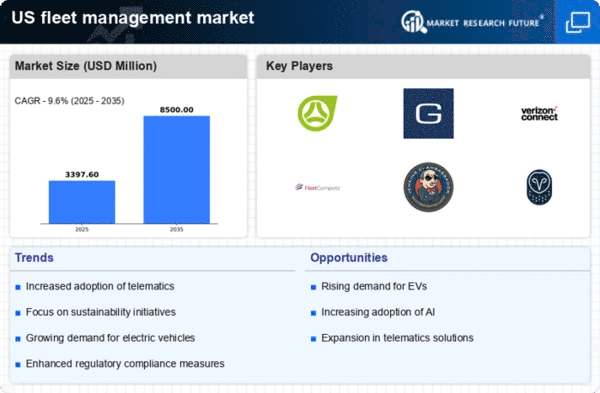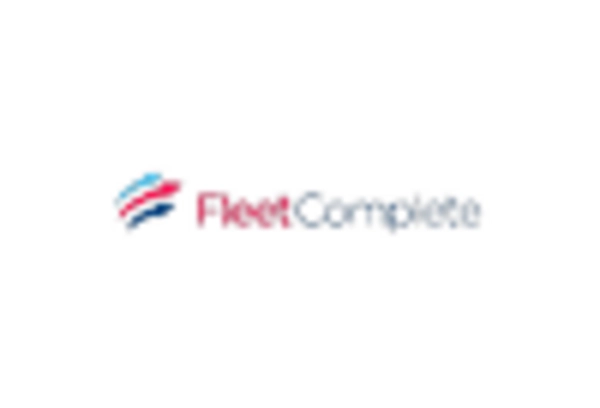Rising Fuel Costs and Efficiency Demands
The rising costs of fuel are a significant concern for fleet operators, directly impacting the fleet management market. As fuel prices fluctuate, companies are compelled to seek ways to enhance fuel efficiency and reduce operational costs. Implementing fuel management systems and adopting alternative fuel vehicles are strategies that many fleets are exploring. According to recent data, fuel expenses can account for up to 30% of a fleet's total operating costs. This financial pressure drives the demand for solutions that optimize fuel consumption and improve overall fleet efficiency. As a result, the fleet management market is likely to see increased investment in technologies that support fuel efficiency initiatives.
Regulatory Compliance and Safety Standards
Regulatory compliance is a critical driver in the fleet management market, particularly in the US. Fleet operators must adhere to various federal and state regulations concerning vehicle safety, emissions, and driver qualifications. The implementation of stricter safety standards has prompted fleet managers to invest in compliance solutions, which can enhance safety and reduce liability risks. For instance, the Federal Motor Carrier Safety Administration (FMCSA) mandates specific guidelines that fleets must follow, influencing operational practices. Non-compliance can result in hefty fines, making adherence essential for fleet operators. Consequently, the need for compliance management tools and services is likely to increase, driving growth in the fleet management market.
Growth of E-commerce and Last-Mile Delivery
The rapid growth of e-commerce is reshaping the logistics landscape, significantly impacting the fleet management market. As online shopping continues to rise, the demand for efficient last-mile delivery solutions is becoming paramount. Fleet operators are adapting to this trend by optimizing their delivery routes and increasing the frequency of deliveries. This shift necessitates advanced fleet management systems that can handle the complexities of urban logistics and ensure timely deliveries. The e-commerce sector's expansion is projected to contribute to a substantial increase in fleet operations, thereby driving the demand for innovative fleet management solutions tailored to meet these evolving needs.
Increased Focus on Sustainability Practices
Sustainability is becoming a central theme in the fleet management market, as companies strive to reduce their environmental impact. Fleet operators are increasingly adopting green practices, such as utilizing electric vehicles (EVs) and implementing eco-friendly driving programs. This shift is driven by both regulatory pressures and consumer expectations for sustainable business practices. The market for electric and hybrid vehicles is expected to grow significantly, with projections indicating that EVs could represent a substantial portion of new fleet purchases in the coming years. As sustainability initiatives gain traction, the fleet management market is likely to evolve, with a focus on solutions that support environmentally responsible operations.
Technological Advancements in Fleet Management
The fleet management market is experiencing a surge in technological advancements that enhance operational efficiency. Innovations such as artificial intelligence (AI), machine learning, and advanced telematics systems are being integrated into fleet operations. These technologies enable real-time tracking, predictive maintenance, and improved route optimization, which can lead to cost reductions of up to 20%. As companies increasingly adopt these technologies, the demand for sophisticated fleet management solutions is likely to grow. The integration of IoT devices further facilitates data collection and analysis, allowing fleet managers to make informed decisions. This trend indicates a shift towards more automated and data-driven fleet management practices, which could reshape the industry landscape.
















